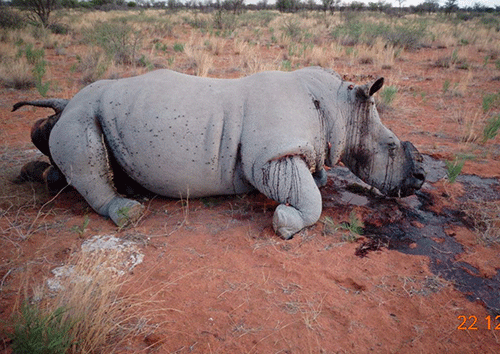The environment and tourism ministry has said rhino poaching remains a serious concern with 87 rhinos poached in 2022, consisting of 61 black rhinos and 26 white rhinos.
The ministry’s spokesperson, Romeo Muyunda, yesterday said the 2022 poaching cases include 15 rhinos poached on rhino custodianship farms, another 25 on white rhino private farms and a majority of 46 were killed in the Etosha National Park.
“We note with serious concern that our flagship park, Etosha National Park is a poaching hotspot. The ministry and its partners in wildlife protection and law enforcement will step up efforts against wildlife crime in Etosha National Park particularly to curb rhino poaching,” Muyunda remarked.
According to him, immediate improved interventions have been put in place across the country, under the leadership of the ministry to fight wildlife crime.
Muyunda reiterated wildlife crime threatens not only the survival of the species but the reputation of the country’s conservation, socio-economic, and tourism development. Namibia’s growing tourism sector is hugely dependent on wildlife. In previous years, Namibia recorded 45 rhinos poached in 2021, 43 in 2020, 61 in 2019, 84 in 2018, and 55 in 2017. So far this year, one rhino has been poached. Regarding elephant poaching, he assured the figures have declined steeply in recent years from the highest figure of 101 in 2015, 50, in 2017; 27 in 2018; 13 in 2019; 12 in 2020; 10 in 2021, and only four in 2022.
The four poached elephants during 2022 include two jumbos killed in the Zambezi region, one in Kavango West, and another one in Kunene region.
“We hope that these figures will continue to descend until we reach the zero-poaching target. For this year, no elephant has been poached,” Muyunda said.
Additionally, he noted the rhino poaching situation requires the involvement of all stakeholders. Therefore, he called upon members of the public to report suspected perpetrators to the relevant authorities.
“The perpetrators of these crimes are within our society, and therefore we should report suspicious activities to the authorities. We must as a nation stand against the illegal plundering of our natural resources by rejecting and condemning wildlife crimes in our beautiful country,” he encouraged.
The ministry applauded the work that the anti-poaching units across the country, comprising of staff from the ministry, Namibian Police, Namibia Defence Force, game farms, and conservancies are doing.
Further, salutation goes to the work of the Prosecutor General’s Office, Namibia Central Intelligence, Blue Rhino Task Force, non-governmental organisations, farmers, the private sector, development partners, and members of the public for the rendered corporation and collaboration in the fight against poaching.
Etosha National Park is one of the largest national parks in Africa, one of the oldest, and is Namibia’s number-one tourist destination. The park is home to 114 large and small mammal species, more than 400 recorded bird species, scores of reptiles and even fish species. The size of the park has been reduced considerably since it was first proclaimed in 1907, but it still remains larger than several European countries. –anakale@nepc.com.na


